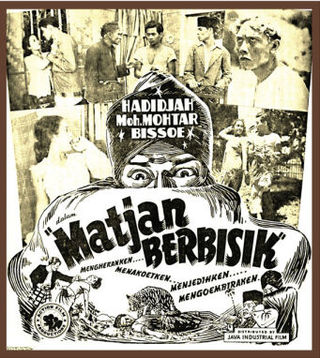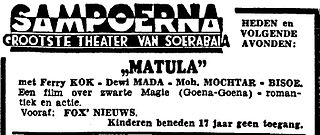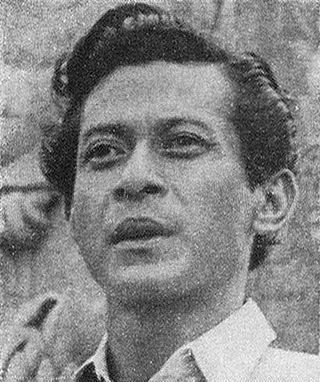
Alang-Alang is a 1939 film from the Dutch East Indies. Starring Mohamad Mochtar and Hadidjah, it follows a young man in his quest to rescue his love from a bandit. Inspired by the Tarzan film series and shot in a period of one month with borrowed animals, the film was a commercial success and credited as a factor in the solidification of the Indies' film industry, as well as helping jump start the Malaysian and Singaporean ones.

The Teng Chun, also known by his Indonesian name Tahjar Ederis, was an Indonesian film producer. Born to a rich businessman, The became interested in film while still a youth. After a period as an exporter, in 1930 he established Cino Motion Picture to produce films in the Dutch East Indies. In a little over a decade he and his company had released at least 31 films, including some of the country's first talkies. Although he experienced a brief resurgence during the 1950s, after Indonesia became independent, he spent the last years of his life as an English teacher.

Abisin Abbas, better known by his pseudonym Andjar Asmara, was a dramatist and filmmaker active in the cinema of the Dutch East Indies. Born in Alahan Panjang, West Sumatra, he first worked as a reporter in Batavia. He became a writer for the Padangsche Opera in Padang, where he developed a new, dialogue-centric style, which later spread throughout the region. After returning to Batavia in 1929, he spent over a year as a theatre and film critic. In 1930 he joined the Dardanella touring troupe as a writer. He went to India in an unsuccessful bid to film his stage play Dr Samsi.

Ratna Asmara, also known as Ratna Suska, was an Indonesian actress and director. Originally active in theatre, she starred in the romance film Kartinah (1940), which her first husband Andjar directed.

Dardanella was a touring theatre company from the Dutch East Indies established by Willy A. Piedro in 1926. Arising from a background of musical theatre, the troupe focused on realistic stories, both adaptations of foreign works and original stage plays about life in the Indies. Starring Dewi Dja' and Tan Tjeng Bok, the troupe performed original works by Piedro and Andjar Asmara. Popular both in the Indies and abroad, Dardanella dissolved during an international tour after 1936. Several of its members later went into film.

Raden Ariffien, often credited as Rd Ariffien, was an Indonesian film director. Initially a nationalist figure, he entered the film industry in 1940 after a period in theatre and radio. During his 25-year career, he was involved in some 36 films in various positions. He later became head editor of the film magazine Varia.

Panggilan Darah is a 1941 film from the Dutch East Indies written and directed by Sutan Usman Karim and produced by Tjho Seng Han for Oriental Film. The black-and-white film starred Dhalia and Soerip as orphaned sisters trying to make a living in the colonial capital of Batavia before moving to Kudus to work at a clove cigarette factory.

Matjan Berbisik is a 1940 film from the Dutch East Indies which was directed by Tan Tjoei Hock and produced by The Teng Chun. Starring Hadidjah and Mohamad Mochtar, the film follows two men who are raised as brothers and compete for the love of the same woman. A copy of the black-and-white film, which featured keroncong music, is stored at Sinematek Indonesia.

Srigala Item is a 1941 film from the Dutch East Indies that was directed by Tan Tjoei Hock and produced by The Teng Chun for Action Film. Starring Hadidjah, Mohamad Mochtar, and Tan Tjeng Bok, the film's plot – inspired by Zorro – follows a young man who became a masked vigilante to take revenge against his conniving uncle. Srigala Item was a commercial success, which Misbach Yusa Biran credits to the plot's use for escapism. A copy of the black-and-white film, which featured kroncong music, is stored at Sinematek Indonesia.
Noesa Penida is a 1941 film from the Dutch East Indies which was directed by Andjar Asmara and produced by The Teng Chun of Java Industrial Film. It tells of a love triangle between two brothers, born to a commoner, and a noble woman.
Elang Darat is a 1941 film from the Dutch East Indies which was directed by Inoe Perbatasari and produced by The Teng Chun for Jacatra Film. A detective film, it follows a man who comes to a village to track the villainous bandit known only as "Elang Darat".

Matula is a 1941 film from the Dutch East Indies which was directed by Tan Tjoei Hock and produced by The Teng Chun of Java Industrial Film. The black-and-white film, now likely lost, follows a young man who tries to give a woman's soul to a shaman as payment for being made handsome.

Dasima is a 1940 film from the Dutch East Indies directed by Tan Tjoei Hock and produced by The Teng Chun. It is the third adaptation of G. Francis' 1896 novel Tjerita Njai Dasima.

Roesia si Pengkor, also known as Hadji Saleh, is a 1939 film from the Dutch East Indies which was directed and produced by The Teng Chun for his Java Industrial Films. Starring Da'ing, Bissu, and Hadidjah, this black-and-white film followed a young woman who is saved from deceptive suitors by her beloved and a man known as "Si Pengkor".

Hadidjah was an Indonesian film actress best known for partnership with Moh Mochtar in seven films released by Java Industrial Film between 1939 and 1941. She was the mother of Citra Award-winning musician Idris Sardi.

Si Gomar is a 1941 film from the Dutch East Indies which was written and directed by Tan Tjoei Hock and produced by The Teng Chun. Starring Hadidjah, Mohamad Mochtar, and Tan Tjeng Bok, the movie follows a brother and sister who are separated by robbers and almost marry before their cousin recognises them.

Mohamad Mochtar, usually credited as Moh Mochtar, was an Indonesian film actor active from 1939 until his death in 1981.

Mas Sardi was an Indonesian composer and musician notable for being the country's first professional music supervisor. He and his wife Hadidjah were the parents of Citra Award-winning musician Idris Sardi.

Ali Joego was a stage and film actor and director active in the Dutch East Indies and Indonesia. During his twenty-year career he appeared in thirty films and directed seven.

Frederik de Kock was an Indonesian actor and singer who was active in the 1930s and 1940s. He was one of the top five stars of Dardanella, along with Devi Dja, Astaman, Tan Tjeng Bok, and Miss Riboet II.


















